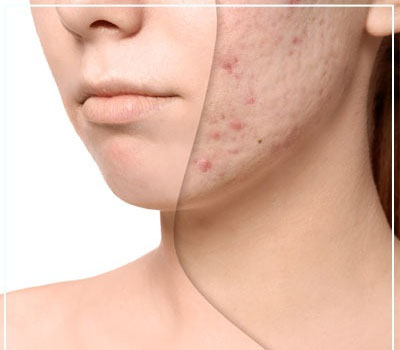Acne Scar Treatment
- Home
- Acne Scar Treatment

Acne Scar Treatment Overview:
Acne scars can be distressing, but various treatment options can help improve their appearance. The choice of treatment depends on the type and severity of scars. Here's a comprehensive guide to acne scar treatment:
Topical Treatments:
- Retinoids: Prescription retinoids, such as tretinoin, can promote skin renewal and improve the appearance of certain types of acne scars.
- Vitamin C: Topical vitamin C serums can help brighten the skin and improve the texture of scars.
Chemical Peels:
- Superficial Peels: Mild chemical peels containing alpha hydroxy acids (AHAs) or beta hydroxy acids (BHAs) can exfoliate the skin and reduce the appearance of scars.
- Medium to Deep Peels: Stronger peels, like trichloroacetic acid (TCA) peels, may be performed by dermatologists to address more pronounced scarring.
Microneedling:
- Collagen Induction Therapy: Microneedling involves creating tiny micro-injuries in the skin, stimulating collagen production and improving the texture of scars.
Laser Resurfacing:
- Fractional Laser Therapy: Fractional lasers target specific areas of the skin, promoting collagen regeneration and smoothing out scars.
- CO2 Laser: CO2 laser resurfacing can be effective for deeper scars, but it may require a more extended recovery period.
Dermal Fillers:
- Hyaluronic Acid Fillers: Injecting dermal fillers, such as hyaluronic acid, can temporarily fill in depressed scars, providing a smoother appearance.
- Collagen Stimulating Fillers: Fillers that stimulate collagen production, like Sculptra, may offer longer-lasting results.
Subcision:
- Release of Scar Tissues: Subcision involves the use of a needle to break up fibrous scar tissues beneath the skin, allowing the depressed area to lift.
Platelet-Rich Plasma (PRP):
- Regenerative Treatment: PRP involves injecting a concentrated form of the patient's own blood to stimulate collagen and elastin production, aiding in scar improvement.
Surgical Excision:
- For Deep or Pitted Scars: Surgical excision is a method where the scar is cut out, and the wound is closed with stitches. It's suitable for specific types of scars.
Dermabrasion:
- Mechanical Exfoliation: Dermabrasion involves the removal of the top layer of skin, helping to smooth out surface irregularities and improve scar texture.
Combination Therapies:
- Dermatologists often recommend a combination of treatments for optimal results, addressing different aspects of scar improvement.
Home Care:
- Sun Protection: Regular use of sunscreen is essential to prevent further damage to the skin and protect healing scars from UV rays.
- Scar Creams: Over-the-counter or prescription scar creams containing silicone or other active ingredients may aid in scar reduction.
Consultation:
- Schedule a consultation with a dermatologist or skincare professional to assess your scars and determine the most suitable treatment plan for your specific needs.
Important Considerations:
- Individual Response: Responses to treatments vary, and multiple sessions may be required.
- Patience: Results often take time, and consistency is crucial for scar improvement.
Working with a qualified healthcare professional ensures a personalized approach to address your unique acne scar concerns. Tailored treatments can significantly enhance the appearance of scars, promoting smoother and more even skin texture.

